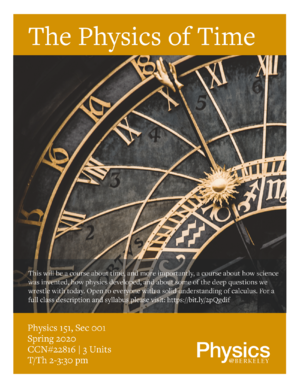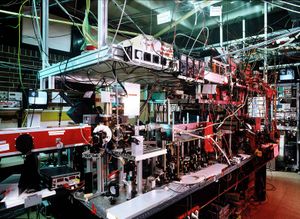Physics 151
Physics 151, also called Elective Physics: Special Topics, is an undergraduate course whose course content is highly dependent upon the instructor, who chooses some "special topic" in physics to explore. The topic in question is generally not the subject of most conventional courses, or are otherwise excluded from the normal undergraduate curriculum. In addition to being referred to as "Special Topics," each Physics 151 course is given its own course title to reflect the content of its particular iteration of the class.
Physics 151 may serve as an elective course in the physics major, and may be taken more than once as its contents differ from semester to semester. Multiple Physics 151 courses with differing content may appear in a given semester.
The Physics of Time
Course flier for the Physics of Time, Fall 2019.
The Physics of Time is a course about the concept of time from multiple physical perspective, with special attention given to historical context. Compared to other special topics courses, the Physics of Time requires comparatively less mathematical background, only recommending a strong calculus background. This course was taught in Fall 2019 by Raphael Bousso. According to the original course announcement, topics could include:
- Astronomical clocks from Heavenly Spheres to General Relativity: Planetary orbits, Earth’s motion. Theory; accuracy (Ptolemy) vs. simplicity (Copernicus) vs. both (Kepler). The role of precise experiments, from the ancients who already understood that circular orbits are ruled out unless they are eccentric, to the perihelion precession of Mercury, to modern determinations of the age of the universe.
- Brief summary of some of the important unifications (Newtonian gravity, Maxwell’s electromagnetism) that bring us to the cusp of relativity, where time becomes more interesting.
- Properties of time: what a clock measures is more interesting than you think! Special relativity, invariants, twin paradox. General relativity, its invariants, gravitational time dilation. Experimental tests of both.
- Cosmological history; time scales for different processes. Big bang model, electroweak phase transition, nucleosynthesis, recombination, CMB, CDM structure growth, baryons (cooling, star formation, stellar physics and lifetimes); vacuum domination, empty cold universe in the distant future.
- Clock technologies: applications and limitations
- Mysteries: The arrow of time: 2nd law, puzzle of the low initial entropy; entropy bounds, puzzle of the high maximum entropy in our universe. Quantum gravity: the breakdown of time along with spacetime at singularities in General Relativity, vs. the fundamental role of time in quantum mechanics. Equivalence principle vs. unitarity. What gives?
Quantum Field Theory (Primer)
Quantum Field Theory (Primer) is a course providing a simplified introduction to the topic of quantum field theory and is taught by Hitoshi Murayama. Since, to date, the Berkeley physics department does not offer a formal undergraduate course in quantum field theory, undergraduates have not had exposure to quantum field theory except through exceptional admittance into graduate courses on the subject, Physics 232A and 232B. This special topics course thus serves to provide interested undergraduate students with the context for this physics formalism, which has broad applications in high-energy and condensed matter physics. This course was offered in Fall 2019 as "Quantum Field Theory Primer" and again in Spring 2020 as "Quantum Field Theory."
Introduction to Quantum Materials
Introduction to Quantum Materials was a special topics course taught by Joel Moore in Fall 2019. The course was attended by both undergraduates and graduates, and was a comparatively advanced introduction to concepts in condensed matter physics such as BCS theory for superconductivity.
Data Science and Bayesian Statistics for Physical Sciences
Data Science and Bayesian Statistics for Physical Sciences was a course offered in Fall 2017 and 2018 by Uroš Seljak. This course was an in-depth introduction into statistical and computational methods in physics, most particularly numerical analysis, data science, Bayesian statistical concepts, and machine learning. As of Fall 2019, this course has been assigned its own course numbers, Physics 188 (undergraduate) and 288 (graduate).
Quantum Information and Computing
BCourses image for Quantum Information and Computing, Spring 2020.
Quantum Information and Computing was a special topics course taught by Hartmut Häffner in Spring 2018, outlining foundational concepts in quantum information processing. These topics included Rabi oscillation, decoherence, and quantum error correction. Quantum Information and Computing is very similar in topic to Physics C191, but the former more heavily emphasizes experimental implementation than mathematical background for quantum computation.
Noise In the Real World
Noise in the Real World was a Fall 2018 special topics course taught by Bernard Sadoulet on noise in physics as viewed from different perspectives. According to the original course description, topics included:
- Noise and statistical fluctuations. Sampling and central limit theorem. How to live with noise and optimize the applied statistical methods (maximum likelihood, optimal filtering in time series and image processing) to minimize its influence.
- Physical origin of noise from a semi-classical point of view. Thermal fluctuations in statistical mechanics, Johnson noise, Shot noise, Brownian motion. Fluctuation-dissipation theorem.
- Quantum origin of noise. Coherent versus incoherent techniques. Quantum limit. Squeezing. Quantum version of Fluctuation-dissipation. Two level systems. Loss of coherence. Collapse of wave function and quantum measurements.

